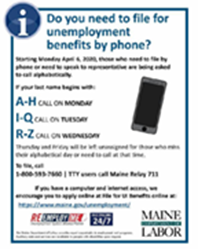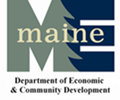|
|
|
The Daily
Edition for Friday, April 17, 2020 |
To view this Daily Impact online, click here. |
|
Welcome to
your Daily Impact newsletter! |
|
|
As a valued member of
the Maine State Chamber of Commerce, we plan to stay in touch with you every
afternoon, through emails like this one and on Facebook and Twitter, until the pandemic passes. We
intend to provide you with the latest state and federal information, as well
as highlighting the creativity and innovation that is occuring here in Maine
during this unpredictable and rapidly changing time. To assist you in
navigating the uncertainties ahead, we have created a diverse and
comprehensive collection of web-based resources to help you take care of yourself and your family, your employees, your business, and your community. |
|
|
Do you have a question? ASK THE EXPERTS. |
We are here to
help in any way we can! |
|
Dana Connors: Reopening
Maine's economy |
|
|
As we move forward together
and enter into the next phase of the pandemic with the health and safety of
Maine people paramount, and knowing that a healthy economy is dependent on
healthy people, the time is now to start thinking about reopening our
economy. Maine needs to begin planning now, and planning well so when we do
reopen, we do so in the safest, most responsible manner possible. |
|
|
It is in this context that the
Maine State Chamber of Commerce would like to highlight
the guidance prepared by our friends at the U.S. Chamber of Commerce.
This is a thoughtful framework dealing with the many issues surrounding
reopening safely, including health and COVID-19 testing in the workplace,
social distancing at work, regulatory issues, the liability of reentering a
new workplace environment, public transportation and childcare considerations
for the workforce, and more. The following links offer
details on specific issues for consideration: * Essential
Services and Resources; * Resolution
of Regulatory and Legal Liability Issues; and, * Support
for Businesses and Individuals. Additionally, you likely are
aware that on Thursday evening, the White House released its blueprint for
reopening the nation's economy. Opening Up America Again
is a three-phased approach offering guidance for state and local officials on
reopening economies and getting people back to work while continuing to
protect public health and safety. We appreciate its measured approach and
direction from medical experts. You also may be aware that
both Senators Susan Collins and Angus King have been appointed to serve on
President Trump's task force on reopening the economy. This is a testament to
the leadership, experience, and expertise of our senators, and to the importance
of getting back to business in states where small employers are in many ways
the backbone of economies. We recognize that some regions
of Maine and business sectors will find it easier to ramp up than others.
There is no one-size-fits-all playbook. We also recognize the importance of
balancing the health of our people and the health of our economy. Some may want
to divide the two, but they are not mutually exclusive, and neither can
operate in a silo. A healthy vibrant economy depends on jobs, economic
activity, and a strong workforce. When we return to health, we need to be
ready to return to work. As the Voice of Maine Business, the Maine State Chamber of Commerce will
continue to be a resource and advocate for Maine businesses during these uncertain
times. We are committed to ensuring that we reopen our economy as quickly and
responsibly as possible so that Maine employers and people can get back to
work. Planning well in this changed business environment is key to our
success. It is our top priority at the Maine State Chamber. |
|
|
Governor Mills on
Guidelines for Reopening the Economy |
|
Late this afternoon, Governor
Janet Mills issued
the following statement in response to the President's Guidelines for
Opening Up America Again: "We all want life to return to normal as
soon as it is safe to do so. Our hearts break to see closed storefronts and
people struggling to make ends meet because of this crisis. At the same time,
we all know that reopening too soon and too aggressively will likely cause a
secondary surge in COVID 19 cases, jeopardizing the lives of Maine people and
further destabilizing the economy. None of us want that. I have been speaking
with a number of economic leaders, including the President of the Federal
Reserve Bank of Boston. Their message is clear: the most important thing we
can do to turn the economy around is to defeat the virus." "As the President acknowledges, the
Governors are in charge of reopening their states' economies and gradually
lifting public health restrictions. Here in Maine, we too are planning a
phased-in reopening, tailored to the demographics and various economic
sectors of our state. Ultimately, the protocols we adopt, made after
consulting with people from all parts of the state, will be guided by fact,
science and public health expertise.
As the President's guidelines note, widespread testing, personal
protective equipment, and contact tracing are critical to lifting
restrictions and reviving the economy; for that reason, the nation's
governors yesterday again urged the Federal government to ensure that all
states have these resources." "I remain in contact with Governor Sununu of New Hampshire and Governor Scott of Vermont regarding actions that may be appropriate for the northern New England region. My Administration, through the Department of Economic and Community Development, has been connecting with individual economic sectors across the state to devise a plan for how we gradually reopen the Maine economy. Those decisions, of course, are driven first and foremost by the need to protect the public health. We will release details of the plan in the near future." |
|
How A Lack Of Tests Has
Hamstrung Maine's Efforts To Curb COVID-19 And Reopen The Economy |
|
According to Maine Public,
excerpted below, Maine Center for Disease Control Director Dr. Nirav Shah on
Wednesday used what he described as an epidemiological axiom to explain a
surge of COVID-19 cases in several long-term care facilities. "When you look
for things, you find them," Shah said. Shah was referring to the universal
testing the CDC had conducted at the long-term care facilities, which
account for roughly 18 percent of confirmed COVID-19 cases in the state and
at least six deaths. But the agency's aggressive response to hotspots in
those congregate settings also highlighted how the state's limited testing
capacity has hamstrug public health officials' attempts to curb the outbreak
here. It also underscores how efforts to ramp up testing capacity could be
crucial to Gov. Janet Mills' future efforts to reopen the Maine economy. "It's a significant factor in how and when, and how quickly, we reopen different sectors and different parts of the economy," Mills said during Wednesday's daily press briefing. "And it depends on how tests are deployed." Shah said distribution of the
rapid tests was largely being determined by the federal government. When
asked about the state's limited testing capacity on Wednesday, Gov. Mills
acknowledged that she was frustrated that testing supplies had been diverted
or shorted by the feds. Dr. Shah, whose agency has
since cleared the high-risk backlog, says the state now has the capacity to
conduct about 3,000 COVID-19 tests, which are prioritized and processed in
two tiers. That's left an incomplete picture of the outbreak in Maine. While
the CDC's daily updates on confirmed case numbers are publicized, many
Mainers suspected of having the disease have not been tested. Some have
settled for a clinical diagnosis, which is not reflected in the state's daily
case update. Others might have been infected and are unaware of it. The U.S.
CDC also believes up to 20 percent of people who have COVID-19 don't have
symptoms, meaning they can unwittingly spread the virus. "Additional testing is
needed," said Shah on Wednesday, adding that widespread testing would allow
the state to take a more aggressive posture against the virus because
infected people could be quickly quarantined. Additionally, tracing an
infected person's contacts would allow state officials to quickly notify
people so they can self-isolate. Such steps, health officials say, are key to
containing the virus while researchers develop a vaccine. And they say it's
also crucial to reopening the economy without preventing a second wave of
COVID-19. Dr. Anthony Fauci, the federal
government's top infectious disease expert, told the Associated Press Tuesday
that the U.S. is currently lacking the capacity to test comprehensively and
trace infections, both needed to safely relax physical distancing
restrictions and reopen the economy. "We have to have something in place that
is efficient and that we can rely on, and we're not there yet," Fauci told
AP. According to the Covid
Tracking Project, an independent website run by journalists, the Maine CDC's
testing rate ranks in the top quartile of the country, but lags behind New
Hampshire, Vermont and Massachusetts. The quality of its testing data
received an "A." Yet the state-by-state rankings might not mean much, given
that the U.S. as a whole is still experiencing a testing shortage. It trails
countries including South Korea and Germany in terms of available testing and
combating the outbreak. While Gov. Mills says ramping up testing is a key factor in any decision to relax business restrictions and physical distancing measures, she also says universal testing seems unrealistic - at least for now. In the absence of widespread testing, Mills says the best way to reopen the economy is "to continue doing what we're all doing. And that means staying home, staying apart. I think we're being successful. I really do." In the meantime, Mills said Thursday that her top message to President Trump is for him to assure the equal distribution of testing materials. "That's pretty much the consensus of all the governors. We all need that," she said. "It is step one in maintaining public health, and it is step one in just thinking of turning around the economy. Testing is vital." |
|
Paycheck Protection
Program Loans Reach $2.22 Billion for 16,196 Maine Small Employers |
|
Sen.
Susan Collins' office reported yesterday that $2.22 billion in forgivable
Paycheck Protection Program loans have been approved for 16,196 small
employers in Maine. According to a press release,
nearly 100 different Maine lending institutions are currently participating
in the program and working around the clock to disburse this funding as
quickly as possible. Due to the high demand for
these loans, the Paycheck Protection Program has run out of funding. Senator
Collins is working with her colleagues to provide an additional $250 billion
for this program so that more small employers in Maine and throughout the
country can continue to pay their employees and survive. "The Paycheck Protection Program has run out of funding. We urgently need an additional $250 billion for this program I co-authored that provides forgivable loans so small employers can survive and give paychecks to their employees," said Senator Collins. "To give just one example, a community bank in Maine has nearly 300 pending applications from self-employed individuals who are requesting an average forgivable loan amount of $26,000. We need to replenish this program immediately so that these individuals can access this critical assistance. As of this morning, $2.22 billion in forgivable Paycheck Protection Programs loans have been approved for 16,196 Maine small employers. This funding is providing crucial support to an estimated 180,000 employees. The extremely high demand for these forgivable loans underscores the urgent need for Congress to act now." |
|
To reserve your banner
ad in the Daily Impact,
please contact Melody Rousseau |
|
U.S. Chamber | OSHA's Guidance and Response to Workplace
Safety and Coronavirus Exposure |
|
Workplace
safety in the context of Coronavirus exposure is critically important, but
what employers should be doing, and what OSHA expects of them is not always
clear. OSHA has issued guidance that addresses some of the questions
employers are having. This summary describes OSHA's comments and some of the
approaches employers should be considering. OSHA has coordinated its approach
with guidance from the Centers for Disease
Control (CDC) with respect to various protective
measures. |
|
Maine DOL Encourages Employers
to File B-1 Separation Forms Through the State Information Data Exchange
System |
|
In an April 16 letter, the
Maine Department of Labor advised Maine employers to file separation forms
(B-1 forms) electronically, stating: "At this point, MDOL is
inundated with mail containing the paper B-1 Separation Forms being sent back
to us. Several years ago, Maine implemented the State Information Data
Exchange System (SIDES) to facilitate the information flowing back and forth
between our unemployment bureau and employers. Given our current workload,
the department must ask
all employers to register with SIDES - a free nation-wide system that is
separate from your ReEmployME account. Once you are logged into SIDES, there
is a detailed guide that provides step-by-step directions for responding to
requests for information, including samples of the screens. Also, when a
response is submitted, SIDES provides a confirmation number for your records. Doing so won't change the processing of the paper that has already been sent. Because the SIDES information is imported directly to our system, it helps identify issues sooner that could have an impact on benefit eligibility. This reduces improper payments and protects the integrity of the unemployment trust fund and employers' experience rating records. For questions or more information, please email [email protected] or call 1-844-754-3508." |
|
Maine Department of Labor
Releases Initial and Weekly Unemployment Claims Data for Week Ending April 11 On April 16, initial claims
for unemployment compensation totaled 13,400 in the week ending April 11,
down from 30,900 the previous week. In the past four weeks initial claims
totaled 89,500, the most ever for a four-week period. Continued claims for
the week totaled 55,700, a new record high, up from 41,300 the prior week. Initial claims totaled about
30,900 and 23,700 for the previous two weeks. Continued claims for the week
increased to 55,692 from the previous week's 41,300. Claims data is
preliminary, subject to revision. Data on claims, the balance of the trust
fund, and other information is available online here. The novel coronavirus
(COVID-19) has caused significant economic hardship for Maine people and job
losses across the state, particularly in the food services and lodging,
health care and social assistance, retail trade, manufacturing, and
entertainment and recreation sectors. |
|
|
"Unemployment benefits provide a lifeline to people who are out of work for reasons beyond their control. The benefits are often used to pay rents, utilities, and for groceries and other basic necessities. These dollars that are spent in our communities help to support the local businesses. In the last four weeks, the department has paid out over $46 million in benefits," said DOL Commissioner Laura Fortman. "In addition to the state unemployment benefits, next week's payments will also include the additional $600 in Federal Pandemic Unemployment Compensation benefits." The Department of Labor
recommends that people file their claims online with a computer as opposed to
a smartphone and do so in the evening when internet traffic is less. The DOL has
implemented an alphabetical call in schedule to help reduce phone line congestion
as the Department ramps up its capacity to receive and process claims. Last
names beginning with A-H should call on Monday, I-Q on Tuesday; and R-Z on
Wednesday. Thursday and Friday are left unassigned for those who miss their
alphabetical day or need to call at that time. As the Department continues to
expand the number of people taking calls, the call-in hours have been
extended to 8:00 a.m. to 3:00 p.m. Those who are unable to connect with a claims
representative by calling 1-800-593-7660 before 3:00 p.m. Monday through Friday
should submit a message at www.maine.gov/labor/contact. The Department of Labor
continues to implement solutions to the challenges created by the sudden and
unprecedented levels of questions and claims to meet the needs of Maine people.
Claims staff are working over the weekend to process applications and are
contacting claimants who have errors on their applications. The department
has also contracted with a Maine-based center to provide first level claims
assistance. Starting this week, 100 people are answering calls, up from 14 a
month ago. The online unemployment system, which Maine implemented a few
years ago, is performing as designed and is available 24/7. For more
information and resources, visit the Department's COVID-19 page. |
|
|
To Level the Playing Field for Maine Students, Maine State
Chamber's Educational Foundation Invites Businesses to Donate for School
Technology |
|
Maine
employers have been remarkably resilient and generous in the many ways they
have stepped up to help their employees and communities in the face of the
global COVID-19 pandemic. We have yet another opportunity for you to
consider. As
schools throughout the state wrestle with how to best deliver continuity of
learning to their students, a need for technology has arisen in several
districts and counties throughout the state. To support today's learners and
tomorrow's employees, the Maine State Chamber of Commerce is asking its
members to participate in a crucial effort to help students engaged in remote
learning during the COVID-19 pandemic. The
collection of charitable, tax-deductible donations through the Maine State
Chamber Educational Foundation will be disbursed through the Maine Department
of Education to counties with high percentages of students without
internet connectivity. As
part of a pilot program, the Maine DOE surveyed building
principals across Maine to identify needs and are working to procure device
and hotspots for all students that need them as quickly as possible. Maine
DOE Coordinator of Secondary Education and Integrated Instruction Beth
Lambert and Maine DOE Chief Innovation Officer Page Nichols, along with a
team at the DOE, are charged with the research, procurement, and deployment
of the devices. If
your company would like to donate to this cause, donations can be sent to the
Maine State Chamber Educational
Foundation, attn: DOE Connectivity Project, at 128 State Street, Suite
100, Augusta, Maine 04330. Questions can be directed to Megan Diver, Senior Government Relations Specialist
for the Maine State Chamber. For DOE specifics, please contact Beth Lambert, Maine DOE's Coordinator of Secondary
Education and Integrated Instruction, or Maine DOE Chief Innovation Officer Page Nichols. |
|
UMaine will graduate 38
students in nursing two weeks early to help meet pandemic needs |
|
To help meet the health care
needs of the state of Maine during the COVID-19 pandemic, 38 undergraduate
students in the University of Maine School of Nursing will graduate April 28
- two weeks early. Early graduation allows them to pursue their licensure
sooner and, ultimately, expedite their entry into the workforce. "The class of 2020 is a very resilient, dedicated group of graduates," says associate professor and registered nurse Kelley Strout, interim director of the School of Nursing. "I'm so proud of this class. They are committed to enter the workforce and provide patient care on the frontlines of the COVID19 pandemic." The students will graduate
with bachelor of science in nursing degrees. When they pass their national
licensing exam, they become registered nurses. The UMaine School of Nursing
has a 95% first time national licensure exam pass rate; the average national
pass rate for first-time test takers is 88%. Thirty-three of the student
nurses plan to practice in Maine. The other five will practice out of state,
including two who are headed to jobs in nurse residency programs at The Johns
Hopkins Hospital and Dartmouth-Hitchcock Medical Center. "We are so very proud of these graduates," says UMaine President Joan Ferrini-Mundy. "We thank them for their incredibly hard work, their bravery and dedication to the health care field in Maine and beyond. The highly selective School of Nursing has very high standards, with faculty providing outstanding training and preparation for students who are ready to make a difference in the world. We congratulate the graduates on this fantastic achievement and wish them all the very best as they move out into the field to help all of us during this difficult time with the pandemic." In UMaine's undergraduate
nursing program, the last semester for seniors focuses on a partnership
experience, Strout says. Each student completes nearly 200 hours working and
learning one-on-one with a registered nurse partner in a hospital or
community health care facility in Maine. Their typical 12-hour schedules
include nights and weekends. In March, the coronavirus
pandemic protocols required some hospitals and health care facilities to
discontinue clinicals for students. By that time, the student nurses had
completed more than half of their required direct-care partnership hours. The
Maine State Board of Nursing then allowed the School of Nursing to provide
virtual clinical instruction with online and simulation resources along with
weekly debriefing sessions in small groups with experienced faculty. Faculty stepped up to provide
the instruction, and students "worked around the clock" to complete the hours
ahead of schedule, Strout says. The accelerated completion of coursework will
allow final grades to be turned in April 20. In the annual nursing pinning ceremonies, graduates traditionally receive a pin to symbolize the completion of their coursework and clinicals, and to welcome them into the profession. This year, the School of Nursing pinning ceremony will be virtual, offered online at 7:00 p.m. on Saturday, April 25 on the School of Nursing's Facebook page. |
|
CMP Donates $100,000 to
Support School Meals |
|
The donation to Full Plates Full Potential will help
students across Maine get food while schools are closed. A $100,000 donation
from Central Maine Power to Portland-based nonprofit Full Plates Full Potential will help
provide students across the state with access to meals while schools are
closed. Many Maine schools are entering their fifth week of closures to stop
the spread of the coronavirus and have set up meal sites to distribute food
students would normally be getting through their school districts. In normal
times, more than 80,000 Maine students rely on school meals as their primary
nutrition, according to a news release Thursday from Full Plates Full
Potential. "Our guiding principle is that no child should go hungry," said Justin Alfond, co-founder of the organization in the release. "During this crisis, more than ever, school meals are the first and best safety net for kids." CMP's donation will help cover
the cost of food as well as equipment like coolers and packaging materials to
ensure proper food safety. It is estimated the funding will support 125
schools in providing access to more than 51,000 students. "The COVID-19 pandemic has uprooted the daily routines and meal security of school children across our state," said David Flanagan, executive chairman of CMP. "We are grateful that we are able to join forces with Full Plates Full Potential, an organization that knows how to work with existing childhood nutrition programs to get food to the kids." |
|
SERIES SPONSORS: Bangor Savings Bank,
Central Maine Power Company Additional
webinars will be forthcoming, and sponsorship opportunities are available. Questions can be directed
to Angela S. Arno, director of programs and events for the Maine State
Chamber of Commerce, by emailing [email protected] or calling (207) 623-4568, ext. 104. |
|
|
Wednesday,
April 22 | Starting at 11:00 a.m. THE INTERSECTION OF WORKERS' COMP The impact of the COVID-19 pandemic on employers, their employees, and our state and national economies has been remarkable. Across the state, businesses large and small are struggling with how to adjust to this new and dramatically different paradigm. Like many other groups, the Maine State Chamber has worked to bring our members and employers all around the state the latest and most accurate information on changes to our unemployment insurance system, paid sick leave, paid FMLA leave, the CARES Act, and the accompanying Paycheck Protection Program and EIDL assistance. However, forgotten up to this point is how
another important aspect of the cost of doing business may be impacted by the
pandemic - workers'compensation insurance. Like so many other business factors,
there are a significant number of unknowns surrounding workers' comp going
forward, including the compensability of COVID-19-related claims, claims that
may arise while employees are working remotely from their homes, and how a
shrinking statewide payroll may impact premium rates, and therefore, overall
premium costs. Sponsored
by MEMIC, MaineHealth / Synernet, Preti Flaherty, and United Insurance |
|
|
|
Wednesday,
April 29 | Starting at 11:00 a.m. WEBINAR FOR SOLE PROPRIETOR
BUSINESSES: This
webinar will focus on the short- and long-term issues arising from the pandemic
for sole proprietors - with suggested solutions. Topics covered will include
a review of up-to-date federal and state legislative opportunities, tax
issues to discuss with your accountant, insurance liability, health insurance
options, credit protection, and steps for sole proprietors to take with
customers. There will also be a brief review of pertinent estate planning
options during the pandemic. Regiser
here |
Sponsored by Lambert Coffin |
|
|
Wed.,
May 6 | Starting at 11:00 a.m. WE ARE STILL FINALIZING THIS
WEBINAR TOPIC TO BE ANNOUNCED |
|
|
Wednesday,
May 13 | Starting at 11:00 a.m. RECENT STATE AND FEDERAL TAX
CHANGES This webinar
will focus on federal tax changes contained in the CARES Act and changes made
at the state level that provide support for businesses during this pandemic.
Additional topics also include a look at the ever-changing landscape at the
federal level for additional stimulus funds and what those changes might look
like. Register
here | Sponsored
by Pierce Atwood and WIPFLi, LLP |
|
NAVIGATING THE LEGAL AND FINANCIAL ISSUES Presented on Wednesday, April 15 | Listen to the recording here The
Maine State Chamber thanks today's webinar presenters and sponsors: Rudman
& Winchell; TD Bank; and, Albin, Randall and Bennett. |
|
|
Tuesday, April 28 | Legislative Strictly Social Virtual
Coffee Hour |
||
|
The
Maine State Chamber of Commerce and the Kennebec Valley Chamber of Commerce
invite you to attend our Legislative Strictly Social
Virtual Coffee Hour. We invite you to grab a cup of coffee at
9:00 a.m. on Tuesday, April 28,
and hear from legislators about current issues. Normally,
our annual series of statewide receptions is an ideal way for you, the Maine
business leader, to interact with business associates, new and prospective
Maine State Chamber members, and state representatives in a relaxed setting.
This year, due to the COVID-19 situation, we will be hosting this event
online as a coffee hour. We will have a panel of Maine Legislators open the
hour and there will be an opportunity for questions through the Zoom chat
feature. Please join us for this presentation. A participation link will be
sent to you after you have completed registration. Learn more or register here. |
|
|
|
Thank You To Our Generous Sponsors! A special thank you to our sponsors from the Legislative
Strictly Social, which has now become the Legislative Strictly Social Coffee
Hour, due to the need for social distancing during this pandemic. Your
continued support is greatly appreciated! |
||
|
SERIES SPONSORS: Casella
Waste Systems, Inc.; Central Maine Power Company; |
||
|
PREMIER SPONSOR: AT&T |
SPOTLIGHT SPONSORS: Backyard Farms, LLC; Brookfield Renewable Energy |
|
|
PRESENTING SPONSORS: Altria
Client Services LLC; American Chemistry Council; Bank of America; Dead River
Company; Emera Maine; Finance Authority of Maine; Hannaford Supermarkets;
MaineHealth; Merrill's Investigations & Security; Mitchell Tardy Jackson
Government Affairs; PhRMA; Preti Flaherty, LLP; Spectrum Healthcare Partners;
The Sheridan Corporation; Unitil Corp. |
OFFICIAL SPONSORS: Bangor
Savings Bank; Charter Communications; Cross Insurance; E.A. Scribner
Insurance Agency, Inc.; Elanco; Enterprise Holdings; IDEXX Laboratories,
Inc.; Maine Better Transportation Association; MEMIC; Maine Primary Care
Association |
|
|
Sponsorship opportunities are
still available for this event. Questions can be directed to Angela S. Arno, director of
programs and events for the Maine State Chamber of Commerce, |
||
|
Use the Maine
State Chamber's "Meeting the Challenge" blog to tell your story! |
|
Numerous Maine
companies stepping up or pivoting nimbly, as Maine people resourcefully
address the challenges of this pandemic. Share your perspective and
experience with us and with the rest of the business community. How are you
facing and overcoming the challenges posed by this pandemic? What are you and
your employees doing in this dramatically different economy? Tell us about
the innovations your company or employees are making or ways you have adapted
your company to meet your customers' needs. Each blog entry should be 300 to 500 words. Join us in creating a written history of the business
community's resilience and innovation during this extraordinary time. Please submit your entries to [email protected]. For more information or questions, please contact Mark
Ellis by emailing [email protected] or by calling (207) 623-4568, ext. 109. |
|
Check out the first post on our "Meeting the Challenge" blog! Todd Mason, President and CEO of the Maine Credit Union League, |
|
Falmouth Fintech Launches
Platform to Automate Hardship Relief |
|
According to a Mainebiz
article on April 16, Constant
Energy Capital Management Inc., a financial technology company in
Falmouth, has launched a software platform designed to speed hardship relief
for financially stressed borrowers. The software, for banks and non-bank
consumer lenders, reduces incoming call volume and long wait times caused by
COVID-19 financial hardships, according to a news release. The program is
designed to provide faster and more accurate decisions about payment
deferrals, loan modifications and other workouts. "Over 10 million Americans have filed for unemployment against the backdrop of $16 trillion of consumer debt," Constant CEO Catherine Powers said in the release. "In response to lost wages, bank and non-bank lenders have directed borrowers to call for payment relief options. With mortgage forbearance requests alone increasing by nearly 2,000%, the COVID-19 crisis has shone a spotlight on the lack of preparedness to support hardship relief requests." Constant's platform evaluates
a borrower's real-time financial situation and provides repayment options
and, when appropriate, loan modifications in a matter of minutes, without
human intervention. "Whether a lender or servicer is offering to skip payments or a more complex hardship solution, that effort can take weeks or months with the high volume of incoming requests for help," Powers said. "However, our platform can do it in minutes by engaging with the borrower, evaluating real-time, customer-specific information and automatically creating relief options that solve the problem and encourage payment performance." The goal is to avoid the kind
of problems caused during the 2008-09 mortgage crisis, when requests for financial
leniency aged in queues for months, Carissa Robb, Constant's president and
COO, said in the release. "Credit scores were damaged, customers were feeling defeated and their willingness to pay was lost," Robb said. "Constant is changing this." |
|
Augusta, Gardiner Downtown
Organizations Offer Fast Help to Eligible Businesses |
|
Gardiner Main Street and Augusta Downtown Alliance
collaborated to raise money to help out their downtown businesses struggling
to stay afloat under restrictions imposed to slow the spread of coronavirus. The Kennebec Journal recently
reported that, inside the Oak Table & Bar in Augusta, Elisha Irland was
spending Thursday afternoon doing something new. "We're doing date night
boxes," the owner of the chef's table restaurant said. The goal is to provide
customers with an experience - not quite the same as they would get with
conversation and information about the food in the restaurant, but still more
than they would get with a simple takeout dinner. Irland will be able to
continue offering food in part through a relief
fund set up help businesses in the downtown districts of Augusta and
Gardiner. "This approach to community one-ness and supporting each other and
shopping local and buying local is what makes the Augusta area great," Irland
said. Last month, most business
activity in Augusta, Gardiner and communities across the state and nation,
dropped off as government and public health officials imposed restrictions on
public gatherings and face-to-face interactions to slow the spread of
coronavirus, which causes COVID-19, the potentially deadly respiratory
disease. As of Thursday, 27 people in Maine have died from coronavirus
infection, and hundreds more have been sickened. The Kennebec Valley Downtown
Relief Fund, a joint project of the Augusta Downtown Alliance and Gardiner
Main Street - both certified Main Street programs," is awarding up to $3,000 per applicant to
help pay business-related expenses like payroll, utilities, rent, mortgage,
insurance and materials needed to make their products to eligible businesses
in the areas they serve. With their clear and simple
goal, both downtown development organizations were able to move money within
their own budgets to establish the fund with $9,000, then reached out to
outside organizations for additional help. Within a few days, the fund had
reached $44,000 with contributions from the Gardiner Board of Trade, the
Augusta Board of Trade, Team EJP, Gardiner Federal Credit Union, Kennebec
Savings Bank, Central Maine Power and KV Federal Credit Union. Hall said the response to the
program has been overwhelming. The initial social media posting drew a
half-dozen applications in short order. On Monday, the organizations met to
review applications, and on Tuesday, they were able to make notifications to
11 businesses and hand out $28,500. While the application deadline has been
set for April 30, Lindley said as long as money is available to distribute,
they will continue to take applications and make funding decisions. Lindley and Hall are working
to secure additional funding to be able to help more businesses, and they
have set up an online
donation link. The Maine Downtown Center, a program of the Maine
Development Foundation, is acting as the fiscal agent. In addition, Team EJP,
which is based in Gardiner, has put up $5,000 to match donations on a a
dollar-for-dollar basis. |
|
JSI Store Fixtures Helping
in the Fight Against COVID-19 |
|
If you have done any grocery
shopping lately, you've probably seen the plastic barriers between you and
the clerk. Thousands of those are being made right in Piscataquis County, at JSI
Store Fixtures in Milo, Maine. In
case you missed it, WABI recently visited
JSI's warehouse. As coronavirus spreads, many
companies are stepping up to help fight the virus. For more than 30 years,
JSI has been manufacturing fixtures for retailers. Now, their attention is
focused on making transparent hygiene shields. Company officials say these
shields provide a physical protective barrier between shoppers and employees.
All barriers are made of plexiglass. "We initially ordered $300,000 worth in advance of having any orders, anticipating getting them, and we have since ordered a few hundred thousand more," said Mark Awalt, president of JSI. "So, we have plenty of plexiglass on hand to continue to assist anybody who might want our help." JSI has been working closely
with Hannaford. They currently have more than a million dollars worth of hygiene
shields on order for Hannaford, Bar Harbor Bank and Trust, and another large
supermarket chain in the Mid-West. So far, more than 10,000 barriers have
been shipped out thanks to the hard work of about 150 employees. When the
economy does begin to open back up, officials with JSI believe these barriers
will be in even greater demand. |
|
Maine Craft Distilling Shifts
to Hand Sanitizer Production |
|
The Portland-based company also has funneled $15,000 in
donations to nonprofits serving Maine communities. Maine Craft Distilling, a
Portland-based distiller of spirits, is making a strategic
shift to hand sanitizer production in response to the coronavirus. The
company also is channeling donations to nonprofits serving Maine communities,
according to a news release. Customers are also leaving tips and making
charitable donations, which have been redirected to various local
organizations, it said. To assist with its new
production line, the distillery has hired five new employees, who now work at
the distiller's Washington Avenue distillery and Public House in Portland. It
said hundreds of customers have been visiting on a daily basis to pick up
hand sanitizer. "Our customers and all Mainers are dealing with an unprecedented global pandemic, and it's important for us to give back to our community and those in need," the distillery's founder and CEO, Luke Davidson, said in a statement. "We will keep producing the hand sanitizer as long as we need to." Manufactured in accordance
with the World Health Organization's formula, the hand sanitizer consists of
80 percent denatured alcohol plus hydrogen peroxide and glycerin. It can be
used in spray bottles or applied directly on hands. The distillery said it
has produced more than 4,000 quarts of hand sanitizer in a matter of weeks,
and raised more than $15,000 for several nonprofits. |
|
|
Virtual ME
Career Fairs Thursday, April 23, 2020 | Online 9:00 a.m. to 5:00 p.m. Featuring a Different
Employer Each Hour JobsInME is proud to present
the Virtual
ME Career Fair. In support of the current COVID-19 situation, we're
taking Career Fairs and moving them online! Virtual
ME Career Fairs allow job seekers to hear from and virtually meet with
employers in a webinar format. Each hour, exhibiting employers present an
overview of their company, discuss available positions, and respond to
participants' questions. |
|
|
|||
|
To join these advertisers in
the Daily
Impact, please contact Melody Rousseau |
|||
|
TO
UNSUBSCRIBE, CLICK HERE. |
NOTICE: In an ongoing effort to thwart
the activities of online hackers, the Maine State Chamber |















